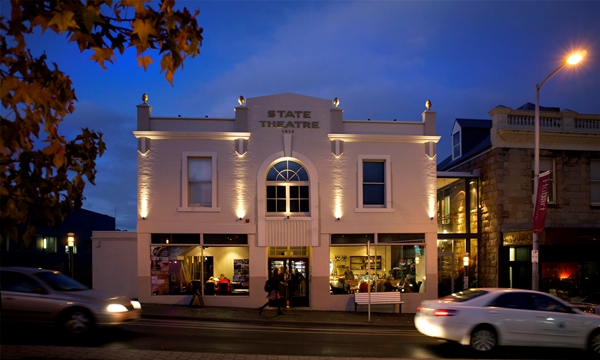The revmaped State Cinemat in North Hobart.
The State Cinema in North Hobart was established in 1913 and is one of the oldest cinemas in Australia – yet there’s no popcorn.
It is also open every day of the year yet there’s no post-mix either, or Marvel films or flashing lights as you wander in.
The State Cinema in North Hobart was established in 1913 and is one of the oldest cinemas in Australia – yet there’s no popcorn.
It is also open every day of the year yet there’s no post-mix either, or Marvel films or flashing lights as you wander in.
It had been run by the Australian Film Institute after it was purchased by the government during the Whitlam era until Hobart local John Kelly purchased the business in 2002.
“Being bankrolled by the government it ran at a big loss and I think the AFI’s budget had been cut,” Kelly tells IF.
“I own a building next door and was approached to see if I would be interested in buying the business, which I did and to cut a long story short since 2002 after a year or so of losing a lot of money I jumped into the transformation program of going from a one-screen cinema with a little kiosk-tuckshop setup to 10 cinemas, a 150 seat café bar, book store and rooftop cinemas, in fact I am building another two cinemas as we speak.”
Kelly has lived in North Hobart his whole life and does all the film selection but says he is by no means a film buff.
“We don’t do any of the blockbuster or Marvel Comics stuff or mainstream Hollywood, it’s a focus on quality films,” he says.
The State Cinema.
“My mantra here is understated elegance, you come in here and there’s no Lavazza flashing signs. There’s no post-mix Coke and we don’t sell popcorn incidentally. No popcorn! Dirty stinking, disgusting messy stuff that it is. It’s selling fresh air and profits from it I know are phenomenal.”
The cinema was the highest grossing location in Australia for Last Cab to Darwin, while the top performer was another Australian film, The Dressmaker.
“The biggest grossing film ever in the cinema’s history was The King’s Speech, films like The Best Exotic Marigold Hotel, that type of film that appeals to from 30-year-old’s and onwards. Slumdog Millionaire was another classic example of a film like that.
“We have got a really powerful demographic where on some films we punch so much higher above our weight it’s not funny. You have to provide a quality experience for people with good wine good coffee, clean toilets where they walk in and it’s an occasion. Even if the film is average they have had a good time when they’re finished. That’s the key.”
In the early days Kelly says the biggest challenge was getting distributors on side.
John Kelly.
“They only want to deal with a cinema that’s giving them a good return on their business. Now with digital the days of only having one or two 35mm prints in a certain zone would always hamstring exhibitors, now there is no excuse and I think distributors have lightened up on the way they restrict. The days of the big cinemas getting the films and the independent cinemas being squeezed are probably over.
“At the same time too the exhibitors have to have the screens faced to placate and do the film justice – it’s common sense.
“We were one of the first cinemas in Australia to go digital and now we are on our third generation of digital equipment. That’s been the key to it. Especially in these small cinemas some of them are only 20 seats. The big 200-seat auditoriums, unless you’re in the major capital cities, are just redundant. It’s like flying a jumbo jet from Hobart to Melbourne every day, you don’t do it.”
The rooftop cinema.
Kelly says there is a bright future for nimble independent operators as more films are made for the older demographic.
“If you look at the Hollywood stuff now it’s more than just the popcorn films. I think anyone who is prepared to take a risk and embrace new ideas there’s definitely a future but they got to get out of the of cinema of the last century.”



